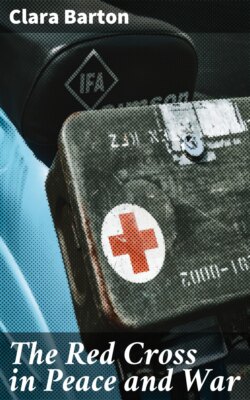Читать книгу The Red Cross in Peace and War - Barton Clara - Страница 21
На сайте Литреса книга снята с продажи.
ОглавлениеAmong these hard facts appears a conscientious theorist and asks, Is not war a great sin and wrong? Ought we to provide for it, to make it easy, to lessen its horrors, to mitigate its sufferings? Shall we not in this way encourage rulers and peoples to engage in war for slight and fancied grievances?
We provide for the victims of the great wrong and sin of intemperance. These are for the most part voluntary victims, each in a measure the arbiter of his own fate. The soldier has generally no part, no voice, in creating the war in which he fights. He simply obeys as he must his superiors and the laws of his country. Yes, it is a great wrong and sin, and for that reason I would provide not only for, but against it.
But here comes the speculative theorist! Isn’t it encouraging a bad principle; wouldn’t it be better to do away with all war? Wouldn’t peace societies be better? Oh, yes, my friend, as much better as the millennium would be better than this, but it is not here. Hard facts are here; war is here; war is the outgrowth, indicator and relic of barbarism. Civilization alone will do away with it, and scarcely a quarter of the earth is yet civilized, and that quarter not beyond the possibilities of war. It is a long step yet to permanent peace. We cannot cross a stream until we reach it. The sober truth is, we are called to deal with facts, not theories; we must practice if we would teach. And be assured, my friends, there is not a peace society on the face of the earth to-day, nor ever will be, so potent, so effectual against war as the Red Cross of Geneva.
The sooner the world learns that the halo of glory which surrounds a field of battle and its tortured, thirsting, starving, pain-racked, dying victims exists only in imagination; that it is all sentiment, delusion, falsehood, given for effect; that soldiers do not die painless deaths; that the sum of all human agony finds its equivalent on the battlefield, in the hospital, by the weary wayside and in the prison; that, deck it as you will, it is agony; the sooner and more thoroughly the people of the earth are brought to realize and appreciate these facts, the more slow and considerate they will be about rushing into hasty and needless wars, and the less popular war will become.
Death by the bullet painless! What did this nation do during eighty agonizing and memorable days but to watch the effects of one bullet wound? Was it painless? Painless either to the victim or the nation? Though canopied by a fortitude, patience, faith and courage scarce exceeded in the annals of history, still was it agony. And when in his delirious dreams the dying President murmured, “The great heart of the nation will not let the soldier die,” I prayed God to hasten the time when every wounded soldier would be sustained by this sweet assurance; that in the combined sympathies, wisdom, enlightenment and power of the nations, he should indeed feel that the great heart of the people would not let the soldier die.
Friends, was it accident, or was it providence which made it one of the last acts of James A. Garfield in health to pledge himself to urge upon the representatives of his people in Congress assembled, this great national step for the relief and care of wounded men? Living or dying it was his act and his wish, and no member in that honored, considerate and humane body but will feel himself in some manner holden to see it carried out.
